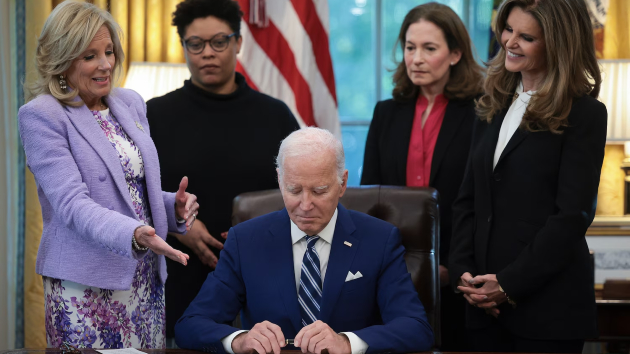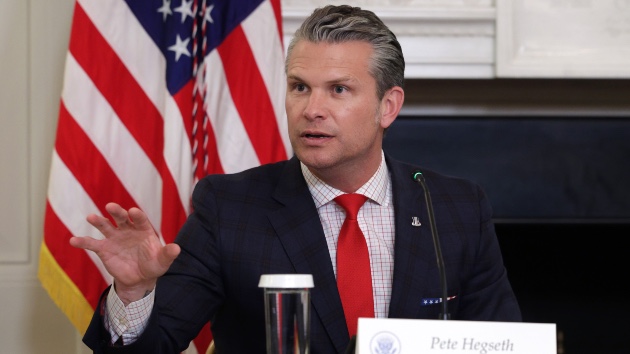Pentagon to make changes at military service academies to stem sexual assaults
Written by ABC Audio ALL RIGHTS RESERVED on August 18, 2023

(WASHINGTON) — The three U.S. military academies must implement changes to stem an increase in sexual assaults, according to a Pentagon study released Thursday that showed cadets and midshipmen were receiving “mixed messages” about prevention measures due in part to a toxic culture of hazing and climate of “cynicism, distrust and stigma.”
Defense Secretary Lloyd Austin has accepted the recommendations from a team of Pentagon experts who made on-site visits to the three military academies — the U.S. Naval Academy in Maryland, the Air Force Academy in Colorado and the U.S. Military Academy at West Point in New York — following a report earlier this year that showed a large increase in the number of reported sexual assaults during the 2021-22 school year.
That report found the number of student-reported assaults at the academies had jumped 18% overall compared to the previous year — making it the highest number of sexual assault incidents since the Defense Department began tracking them in 2006. Additionally, an anonymous survey accompanying the report indicated one out of every five female cadets and midshipmen had experienced unwanted sexual contact over the previous year.
Because of these assaults, Austin ordered the on-site evaluations of the military academies.
“While the service academies are dominant in many domains, they have far more work to do to halt sexual assault and harassment,” Austin wrote in a memo. “Data continue to suggest that the occurrence of these crimes is trending upward. That is disturbing and unacceptable. It endangers our teammates and degrades our readiness.”
Some of the recommendations to improve the military academies detailed in the report include offering trainings for student leaders to better help their classmates, encouraging and promoting mental health resources, and ending traditions of hazing and mistreatment.
“This is a difficult moment, and it must serve as a turning point for the service academies. I feel this especially strongly as a proud graduate of a service academy,” said Austin, who attended West Point. “We owe it to all of our cadets and midshipmen, to the troops whom they will lead, and to the American people to make determined progress toward eradicating harmful behaviors and enabling every Service member to contribute their very best each day.”
Findings and recommendations
Pentagon officials visited the three military academies to try to get a hands-on understanding of what might have contributed to the sharp increase in the number of reports in recent years. Based on dozens of visits, they drew recommendations accepted by Austin that will lead to changes in some of the academies’ leadership traditions that may have fostered toxic climates.
One of the things the Pentagon officials found was that hazing was degrading the positive efforts being made in other areas such as sexual assault prevention, reporting and treatment for victims.
“You can be doing a lot of good activities, but if they are implemented in unhealthy or toxic climates, it will degrade the effectiveness of those efforts,” Elizabeth Foster, executive director of the Department of Defense’s Office of Force Resiliency, told reporters Thursday.
“The reason for that is that when cadets and midshipmen learn one thing about leadership or prevention in the classroom, but don’t see that reinforced in other settings, it sends mixed messages about healthy norms and expectations for how they are to treat each other,” she said.
That mixed messaging was found to be different at each of the academies based on their individual traditions and mentoring concepts. That meant the team’s recommendations needed to be tailored specifically to each academy.
“While these structures, these pure leadership structures, may have been effective in the past, our finding suggests they may need some adjustment now because the culmination of all of this was a climate of cynicism, distrust and stigma,” said Andra Tharp, the senior prevention advisor for the Department of Defense’s Office of Force Resiliency.
“The cynicism and distrust really came from mixed messages that what was communicated and taught was a little bit different from what was modeled and reinforced,” she said.
Tharp said that is why the team’s recommendations are also focused on making “structural and foundational changes” at the academies to counter those effects.
“Our most significant recommendations really get at strengthening the peer leadership structure and these are the structural changes that we’re recommending, and again, they vary across the different service academies based on the severity of issues that we identified,” said Tharp.
For example, the Pentagon officials recommended that the Air Force Academy end its “fourth class” system, which they said they believe exposes first-year cadets to hazing and mistreatment. Under the current “fourth class” system at the academy, the first-year students are not given any leadership opportunities and are not acknowledged as actual “cadets” — a title they receive during their second year.
“These may be intended to create a bond within the class, but that’s certainly not everyone’s experience,” said Tharp. “And instead, they carry these negative experiences and unhealthy norms about how you treat others through their time at this service academy and into the force.”
At the Naval Academy, the officials recommended the addition of seasoned officers and non-commissioned officers to support their counterparts at the academy to provide mentorship opportunities and supervision to midshipmen.
At West Point, the officials recommended a review of the training given to cadets who are in leadership positions to enhance their ability to meet the needs of incoming cadets.
The officials also suggested that training for sexual assault prevention, stress relief, misconduct, social media and other life issues be added to the academies’ school curriculums and graded to prioritize their importance. The Pentagon officials found during their visits that these discussions were taking place after hours and on weekends, according to the report.
Austin has ordered each of the military services to provide plans of action by Oct. 31 for how they plan to implement the recommendations made by the panel. He also ordered them to regularly review their plans after that.
Copyright © 2023, ABC Audio. All rights reserved.
 KVSP
KVSP 




